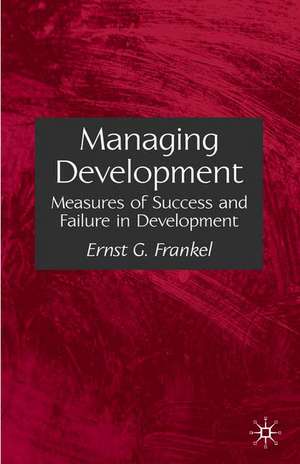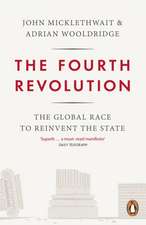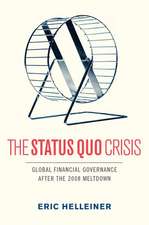Managing Development: Measures of Success and Failure in Development
Autor E. Frankelen Limba Engleză Hardback – 19 apr 2005
| Toate formatele și edițiile | Preț | Express |
|---|---|---|
| Paperback (1) | 388.13 lei 43-57 zile | |
| Palgrave Macmillan UK – 2005 | 388.13 lei 43-57 zile | |
| Hardback (1) | 392.60 lei 43-57 zile | |
| Palgrave Macmillan UK – 19 apr 2005 | 392.60 lei 43-57 zile |
Preț: 392.60 lei
Nou
Puncte Express: 589
Preț estimativ în valută:
75.13€ • 78.63$ • 62.53£
75.13€ • 78.63$ • 62.53£
Carte tipărită la comandă
Livrare economică 31 martie-14 aprilie
Preluare comenzi: 021 569.72.76
Specificații
ISBN-13: 9781403949493
ISBN-10: 1403949492
Pagini: 303
Ilustrații: XXI, 303 p.
Dimensiuni: 140 x 216 x 19 mm
Greutate: 0.52 kg
Ediția:2005
Editura: Palgrave Macmillan UK
Colecția Palgrave Macmillan
Locul publicării:London, United Kingdom
ISBN-10: 1403949492
Pagini: 303
Ilustrații: XXI, 303 p.
Dimensiuni: 140 x 216 x 19 mm
Greutate: 0.52 kg
Ediția:2005
Editura: Palgrave Macmillan UK
Colecția Palgrave Macmillan
Locul publicării:London, United Kingdom
Cuprins
Table of Contents List of Figures List of Tables Terms and Abbreviations Prologue Introduction PART 1: DEVELOPMENT ECONOMICS OR UNREALISTIC DREAM? Why Economic Principles of Development Do Not Work Defining Poor Developing Countries Unrealistic Dream The Real Developing World PART 2: ECONOMIC TRENDS Real Measures of Economic Performance Development and Trade Population Planning Infrastructure in Development Financing of Developments Democracy in Government PART 3: ASIA - THE FUTURE CENTER OF THE WORLD ECONOMY Economic Growth and Economic Freedom: The Lessons from The Orient Asian Success and Western Culture Human Rights and Economic Development Should We Admire or Criticize the Asian Way to Economic Growth? Investing in Asia China: The Globe's New Economic Locomotive Asian Potentials and Problems PART 4: DEVELOPING AFRICA: THE GLOBAL BASKET CASE African Malaise Africa's Dilemma A Future for Africa Envisioning Africa's Future New Challenges for Africa PART 5: DEVELOPING EUROPE European Population Dilemma Building the European Union PART 6: AMERICA'S ACHIEVEMENTS AND HOPES Mexican Evolution South America - Winning and Losing Opportunities PART 7: DEVELOPMENT FINANCING OR 'TAKE FROM THE POOR AND GIVE TO THE RICH' Investment for Development Hypocrisy in Development Financing Privatization in Developing Countries Debt Relief for Forgiveness PART 8: ACTORS IN PUBLIC DEVELOPMENT FINANCING International Finance Institutions Regional Development Institutions Evaluating the IMF Governance of World Bank and IMF Role of Non-governmental and Social Non-profit Organizations in Development PART 9: STRATEGIES FOR FUTURE ECONOMIC DEVELOPMENT Development Risk Management Government Spending, Globalization and Development Development Policies and Strategies for Success Effective Development Project and Project Risk Management PART 10: THE FUTURE OF DEVELOPMENT World Economy, Economic Blocks and National States Need for Interactive Development New Strategies for Assuring Development Effectivenesss Making Development Work Postscript Appendix A: The United Nations: UN Budget/UN Staffing/Budget Components Appendix B: Use of Expert Choice in Development Project Selection, Planning and Design References Bibliography Index
Notă biografică
ERNST G. FRANKEL is Emeritus Professor of Ocean Systems and Professor of Management at Massachusetts Institute of Technology, USA. His research interests are in large-scale project management and implementation. He has worked previously as a consultant to the World Bank, the Asia and Inter American Development Bank and to the Chinese, Nigerian and Singaporean Governments among others. He has been a project manager for infrastructure projects in areas such as logistics, education, power and transportation in 67 countries.






















